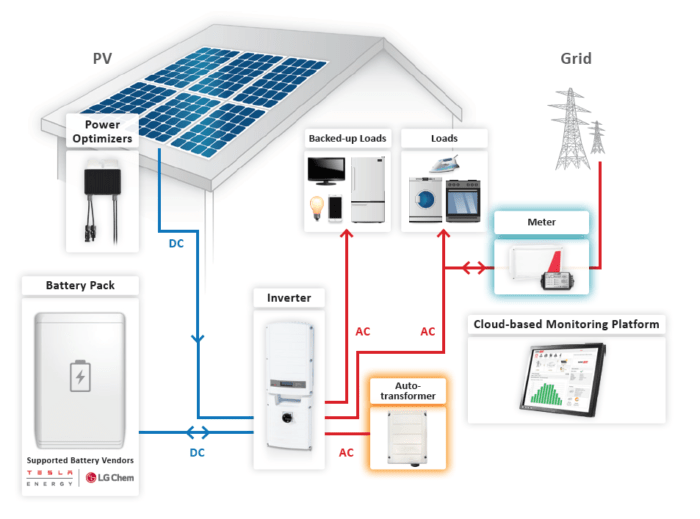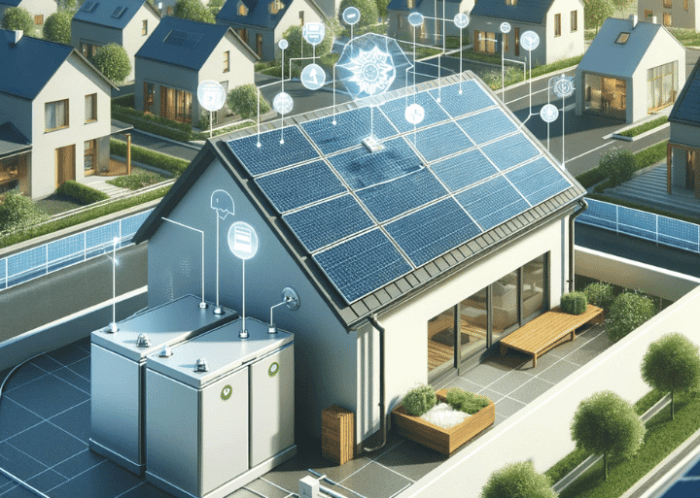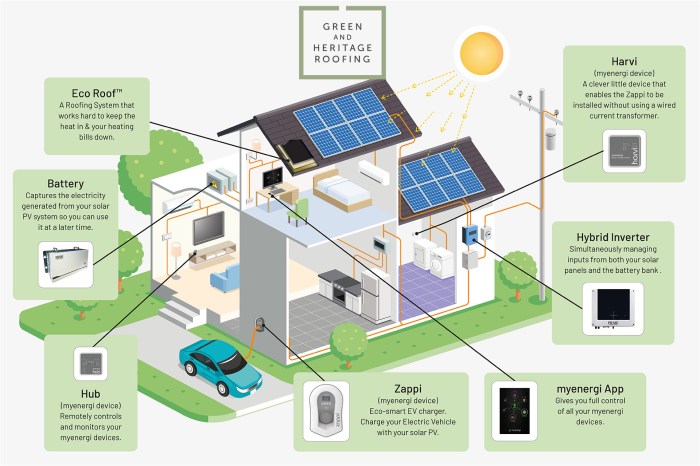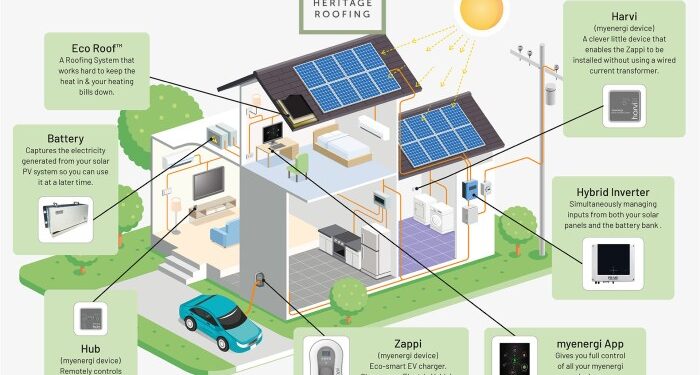Embarking on the journey of Integrating Smart Homes With Solar and Battery Backup Systems, this introductory paragraph aims to provide an intriguing glimpse into the fusion of modern technology and sustainable energy solutions.
Delving deeper into the realm of smart homes and renewable energy, this guide explores the seamless integration of solar panels and battery backup systems for a more efficient and eco-friendly living environment.
Introduction to Smart Homes and Solar Energy

Smart homes are residences equipped with technology that allows homeowners to control and automate various systems, such as lighting, heating, and security, remotely. These homes offer convenience, energy efficiency, and increased security to residents.
Integrating solar energy systems into homes can provide numerous benefits. Solar panels harness the power of the sun to generate electricity, reducing reliance on traditional energy sources and lowering utility bills. Additionally, solar energy is clean and renewable, making it an environmentally friendly choice for homeowners.
Advantages of Integrating Solar Energy into Smart Homes
- Solar energy systems reduce electricity bills and provide long-term savings.
- Decrease reliance on traditional energy sources, reducing carbon footprint.
- Increased energy independence and resilience during power outages.
- Boost home value and appeal to eco-conscious buyers.
Importance of Renewable Energy Sources in Smart Homes
In the context of smart homes, utilizing renewable energy sources like solar power is crucial for sustainability and reducing environmental impact. By incorporating renewable energy technologies, homeowners can contribute to a greener future and create more energy-efficient living spaces.
Components of a Smart Home Solar System

When it comes to setting up a smart home solar system, there are several key components that play crucial roles in ensuring efficient energy generation and storage. Each component serves a specific function in the system, working together to harness solar power and provide backup energy when needed.
Solar Panels
Solar panels are the heart of any solar system, converting sunlight into electricity through photovoltaic cells. There are different types of solar panels available, such as monocrystalline, polycrystalline, and thin-film panels. Monocrystalline panels are known for their efficiency and space-saving design, while polycrystalline panels are more budget-friendly.
Thin-film panels, on the other hand, are lightweight and flexible, making them suitable for unconventional installation areas.
Inverter
The inverter is responsible for converting the direct current (DC) electricity generated by the solar panels into alternating current (AC) electricity that can power your home appliances. There are three main types of inverters: string inverters, microinverters, and power optimizers.
String inverters are cost-effective and suitable for large installations, while microinverters and power optimizers offer individual panel optimization for increased efficiency.
Batteries
Batteries are essential for storing excess solar energy generated during the day for use at night or during cloudy days. Lithium-ion batteries are popular for smart home systems due to their high energy density and long lifespan. Lead-acid batteries are a more affordable option but require regular maintenance.
Additionally, flow batteries are gaining popularity for their scalability and long cycle life.
Integration of Solar Panels with Smart Home Devices
Solar panels can be seamlessly integrated with smart home devices to create a more efficient and sustainable living environment. By connecting solar panels to smart home systems, homeowners can maximize energy savings and reduce their carbon footprint. Automation and monitoring systems play a crucial role in optimizing energy usage in smart homes, ensuring that energy is used most effectively and efficiently.
Examples of Integration
- Solar panels can be connected to smart thermostats to adjust temperature settings based on the amount of available solar energy, maximizing energy savings.
- Smart lighting systems can be synced with solar panels to automatically adjust brightness levels according to the time of day and available sunlight, reducing energy consumption.
- Home energy monitoring devices can provide real-time data on energy production from solar panels, allowing homeowners to track their energy usage and make informed decisions to optimize efficiency.
Benefits of Integration
- Reduction in electricity bills by harnessing solar energy to power smart home devices and appliances.
- Lower carbon emissions by utilizing clean, renewable energy sources like solar power.
- Increased energy independence by generating electricity on-site and reducing reliance on the grid.
Automation and Optimization
- Smart home systems can automate energy-intensive tasks based on energy production from solar panels, such as running appliances during peak sunlight hours.
- Energy monitoring systems can provide insights into energy usage patterns, allowing homeowners to adjust their behavior and optimize energy consumption.
- Integration of smart devices with solar panels can lead to a more sustainable and eco-friendly lifestyle, promoting energy efficiency and conservation.
Battery Backup Systems for Smart Homes
Battery backup systems play a crucial role in smart homes equipped with solar panels. These systems ensure uninterrupted power supply even during outages, providing a reliable source of energy for essential devices and appliances.
Types of Batteries Used for Backup in Smart Home Setups
- Lithium-ion Batteries: Known for their high energy density and long lifespan, lithium-ion batteries are commonly used in smart home backup systems. They are efficient and require minimal maintenance.
- Lead-acid Batteries: Although bulkier and less energy-dense compared to lithium-ion batteries, lead-acid batteries are a more affordable option for storing backup power in smart homes.
- Flow Batteries: These batteries offer scalability and long cycle life, making them suitable for smart home applications where a higher level of energy storage is required.
Importance of Battery Storage for Uninterrupted Power Supply
Battery storage is essential for smart homes with solar panels to ensure continuous power supply during outages or when solar energy production is insufficient. It acts as a reliable backup, allowing homeowners to power their critical loads and maintain functionality in their smart devices without interruptions.
With the right battery backup system, smart homes can remain operational and energy-efficient even when the grid is down.
Maximizing Energy Efficiency in Smart Homes

When it comes to integrating smart home systems with solar and battery backup, maximizing energy efficiency is key to reaping the benefits of these technologies. By implementing energy-efficient practices, homeowners can not only reduce their carbon footprint but also enjoy significant cost savings in the long run.
Tips for Maximizing Energy Efficiency
- Invest in energy-efficient appliances: Opt for smart appliances that are designed to consume less energy without compromising on performance.
- Utilize smart thermostats: Programmable thermostats can help regulate your home's temperature more efficiently, reducing energy waste.
- Implement smart lighting solutions: Use smart light bulbs and switches to control lighting remotely and automate schedules for optimal energy usage.
Cost Savings with Energy-Efficient Practices
By embracing energy-efficient practices in a smart home setup, homeowners can expect to see a noticeable decrease in their energy bills over time. The initial investment in energy-efficient appliances and devices is often offset by the long-term savings achieved through reduced energy consumption.
Tracking and Optimizing Energy Consumption
- Smart energy monitors: Install energy monitoring systems to track real-time energy usage and identify areas where energy can be saved.
- Automated energy optimization: Smart home systems can analyze energy usage patterns and adjust settings to optimize energy consumption based on your preferences and habits.
Concluding Remarks
In conclusion, the marriage of smart homes with solar and battery backup systems offers a promising path towards energy independence and sustainability. By harnessing the power of the sun and cutting-edge technology, homeowners can pave the way for a greener future while enjoying the benefits of a more intelligent and resilient living space.
Question & Answer Hub
How can solar panels improve energy efficiency in smart homes?
Solar panels convert sunlight into electricity, reducing reliance on traditional power sources and lowering energy bills in the long run.
What types of batteries are commonly used for backup in smart home setups?
Commonly used batteries include lithium-ion batteries and lead-acid batteries, known for their reliability and efficiency in storing backup power.
What are some cost-saving tips when integrating smart home systems with solar and battery backup?
Implementing energy-efficient practices, such as using programmable thermostats and LED lighting, can lead to significant cost savings over time.
How does automation and monitoring optimize energy usage in smart homes?
Automation systems can regulate energy consumption based on real-time data, ensuring optimal usage and reducing wastage in smart homes.



